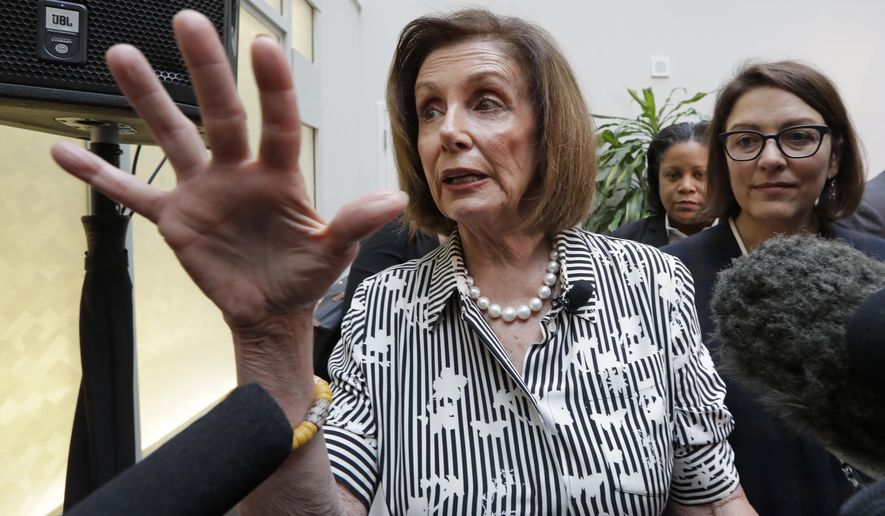OPINION:
Presidential campaigns reveal important truths about political parties. It’s easy to pass off candidates’ debate comments and stump speeches as mere political rhetoric. But leading Democrats’ support for nationalized health care isn’t just theoretical.
We’re already seeing Democrats’ radical approach in real legislative proposals, such as House Speaker Nancy Pelosi’s prescription drug legislation, H.R. 3. This proposal would accelerate the nationalization of health care, diminishing patients’ access to the treatments of today as well as the cures of tomorrow.
The Pelosi plan mandates the government “negotiate” drug prices, not just on behalf of federal programs, but for the entire private sector as well. Traditionally, the government is not permitted to interfere with price negotiations — and for good reason. Government interference would undermine the market-based structure of our health care system, which fosters competition between plans and incentivizes them to cover the widest range of drugs and therapies possible. This change would lead to an increase in access restrictions, resulting in delays and disruptions in vital care for American patients.
The plan would also allow federal officials to set drug prices based on the prices found in six foreign, government-controlled health systems. This is not the U.S. secretary of Health and Human Services negotiating a price; it is allowing the French minister of Health and other foreign officials to dictate the U.S. market.
This form of government price-setting dramatically limits patients’ access to treatment. Patients in the reference countries listed in the Pelosi plan lack access to many of the latest innovations to treat cancer, diabetes, respiratory conditions and cardiovascular disease. For example, while nearly 90 percent of new medicines launched around the world from 2011 to 2018 are available in the United States, only 51 percent of these are available in the six reference countries, on average. This is unacceptable and hardly a system that our political leaders should look to replicate.
Mrs. Pelosi’s plan will also have a devastating impact on investment in U.S. biomedical innovation. The plan stipulates that if a pharmaceutical company fails to agree to the government’s determined price, it will face a tax of up to 95 percent of a product’s total U.S. revenue — effectively a death penalty for private companies, especially start-ups and small, highly innovative biopharmaceutical firms. This would be a crushing blow to not only the medical industry but our economy as a whole.
The United States has always been a leader in medical advancement, fostering a research and development environment that continually produces new, more effective drugs and treatments. America’s biopharmaceutical industry supports more than 4 million jobs. The Pelosi plan would undermine our competitive advantage in biomedical research, potentially leading to the permanent loss of between 720,000 and 1.4 million high-quality U.S. jobs. Research at universities and hospitals in all 50 states, especially research-intensive states such as California, Massachusetts, Michigan, Minnesota, Pennsylvania and New Jersey, could also be put at risk.
This ultimately brings Congress to a crucial and likely revealing crossroads. Will lawmakers bend to the radical elements of Mrs. Pelosi’s plan and begin the nationalization of U.S. health care — restricting patient access, imperiling future cures and costing the economy a million jobs? Or will they pump the brakes on dangerous policies that risk harming the industry, the larger health care system and the patients who rely on it?
Yes, health care reform is needed, but this can be accomplished through common-sense ideas, such as capping patients’ out-of-pocket costs, ensuring that the savings from drug company discounts are passed through to patients, and continuing the FDA’s record-breaking number of generic drug approvals to increase competition and lower costs. What we don’t need are policies imported from government-run health systems abroad that command and control whether new medicines will be available to patients and which patients can receive them.
Unless Democrats change course, the 2020 presidential and congressional elections will be a choice between two very different visions for our country. Republicans promoting economic growth and job creation based on sound fiscal management, pro-competitive policies and common-sense regulatory reforms. And Democrats following their Pied Pipers on the left, advancing policies that could inflict long-standing damage to the health care system and the economy.
I know which vision the American people share.
• Chris Christie is the former governor of New Jersey.




Please read our comment policy before commenting.